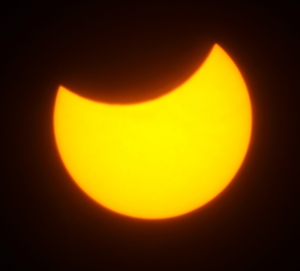Scientists seeking eclipse weather breakthroughs - in more ways than one
Release Date 18 March 2015

Cloudy skies are forecast across much of the UK on Friday, which may obscure the partial solar eclipse and disappoint would-be observers. But scientists at the University of Reading say there is still much to study in the eclipse weather, whether or not the sky is clear.
And no matter what the weather does, people across Britain can still be part of the largest ever eclipse weather experiment by observing what happens to the weather as the moon partially blocks out the sun.
A fleeting breakthrough in the clouds as the atmosphere cools, giving a glimpse of the celestial line-up - a phenomenon reported anecdotally at previous eclipses - is just one of several effects on the weather that scientists are hoping to observe on Friday.
To test these ideas, organisers of the National Eclipse Weather Experiment (NEWEx) need to recruit an army of citizen scientists across Britain to record changes to weather conditions on Friday morning.
A once-in-a-generation opportunity
Professor Giles Harrison, head of the Department of Meteorology at the University of Reading, is leading the national experiment.
"This is the first big partial eclipse to happen in the UK since 1999, and the next one isn't until August 2026, so this is a once-in-a-generation opportunity," he said.
"By observing what happens on Friday we are effectively turning the skies of Britain into a giant weather lab, giving us a rare chance to see what happens when you ‘turn down the sun'.
"This will give us a precious insight into how the sun influences the clouds and wind, as well as more obvious effects, such as temperature. By improving our understanding of how the weather works, we're better able to predict it, meaning scientists can further improve weather forecasts."
Solving eclipse mysteries
Professor Harrison said the eclipse weather measurements could also help to answer some of the enduring mysteries of eclipses - such as the so-called ‘eclipse wind'.
"There are several accounts of an ‘eclipse wind', a change in the breeze as the eclipse reaches its greatest extent, but we've never had enough data to definitively prove or disprove its existence before," said Professor Harrison.
"While we have more data now than ever from weather stations and satellites, we still need people to provide their own observations, particularly to tell us about cloud cover. This could also help to establish if breaks in the cloud are common during the peak of an eclipse."
HOW TO TAKE PART
Anyone, including children, can take part - even if, on the day, it is cloudy or raining. All the observations from across the UK will be combined with other data to provide the most detailed picture of the effects of an eclipse on the weather ever assembled. This will help scientists gain important insights into how our atmosphere, and our weather, works.
Organisers are particularly keen to get the help of school pupils, who will be able to learn first-hand about science by participating in a world-leading weather experiment.
It will be possible to take part using simple instruments, or even just with observations made without any instruments at all. Then send all your timed observations to the team co-ordinating the experiment using this online form by 9pm on Friday. Read this for information on what to look out for.
WARNING: Organisers are reminding participants never to look directly at the sun at any time, even for just a second, as direct sunlight can permanently damage your eyes. Advice on how to safely observe the eclipse is available here.
FULL DETAILS: Visit the Department of Meteorology website.
INFO FOR SCHOOLS: Details for schools and teachers on how to take part.
VIDEO: Watch the BBC School Report on the plans.
FAQs: Frequently Asked Questions about the experiment.